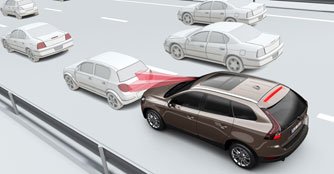Safety technology in a Volvo reduces accident by 28 percent
14 Jun 2015|3,276 views
One of the most comprehensive scientific studies performed on collision avoidance systems in cars reveals that Volvo Cars' standard City Safety technology reduces insurance claims for rear-end frontal collisions by 28 percent.

The study is based on robust insurance company data which covers over 160,000 vehicle years in traffic making it unique in the study of collision avoidance systems. Unlike police or emergency response sourced data, insurance company data covers all accidents - regardless of whether people are injured, giving a more holistic overview of the real-life performance of Volvo Cars' standard City Safety technology.
Volvo Cars' City Safety technology also delivers more immediate benefits to Volvo drivers, with insurance companies offering discounts of between 20 to 25 percent on insurance premiums on several markets thanks to this innovative technology.
"We see our continuous development of collision avoidance and steering assist systems as stepping stones towards autonomous cars. Volvo Cars is already at the forefront of autonomous car development and our huge credibility in car safety is a major advantage. We believe that collision avoidance systems will be an enabler for cars that do not crash and allow people the freedom to drive or be driven in comfort to their destination," said Magdalena Lindman, Technical Expert, Traffic Safety Data Analysis at Volvo Cars.
With Volvo Cars' long held Vision 2020, the Swedish car maker aims to deliver cars in which no one is seriously injured or killed by the year 2020. Their longer term goal is to design cars that do not crash.
One of the most comprehensive scientific studies performed on collision avoidance systems in cars reveals that Volvo Cars' standard City Safety technology reduces insurance claims for rear-end frontal collisions by 28 percent.
The main benefit of City Safety is its ability to reduce the incidence of whiplash and other neck-related injuries caused by low-speed traffic accidents. The secondary benefit to Volvo car drivers is a reduction in accident damage to their cars and the costs that this incurs.
The study is based on robust insurance company data which covers over 160,000 vehicle years in traffic making it unique in the study of collision avoidance systems. Unlike police or emergency response sourced data, insurance company data covers all accidents - regardless of whether people are injured, giving a more holistic overview of the real-life performance of Volvo Cars' standard City Safety technology.
Volvo Cars' City Safety technology also delivers more immediate benefits to Volvo drivers, with insurance companies offering discounts of between 20 to 25 percent on insurance premiums on several markets thanks to this innovative technology.
"We see our continuous development of collision avoidance and steering assist systems as stepping stones towards autonomous cars. Volvo Cars is already at the forefront of autonomous car development and our huge credibility in car safety is a major advantage. We believe that collision avoidance systems will be an enabler for cars that do not crash and allow people the freedom to drive or be driven in comfort to their destination," said Magdalena Lindman, Technical Expert, Traffic Safety Data Analysis at Volvo Cars.
With Volvo Cars' long held Vision 2020, the Swedish car maker aims to deliver cars in which no one is seriously injured or killed by the year 2020. Their longer term goal is to design cars that do not crash.
Latest COE Prices
June 2025 | 2nd BIDDING
NEXT TENDER: 09 Jul 2025
CAT A$98,124
CAT B$116,670
CAT C$65,000
CAT E$116,889
View Full Results Thank You For Your Subscription.



















